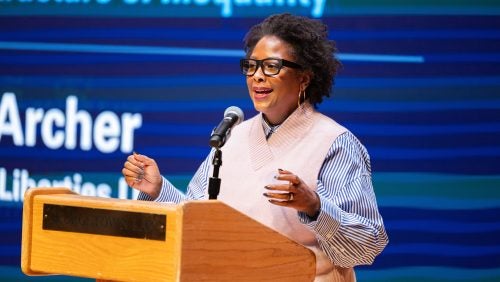ACLU and NYU Law’s Deborah N. Archer Draws Connections Between Transportation Infrastructure and Racial Inequality
October 27, 2025

ACLU President Deborah N. Archer delivered the 2025 Philip A. Hart Memorial Lecture.
Leading civil rights lawyer and scholar Deborah N. Archer visited Georgetown Law on October 22 to deliver the 2025 Philip A. Hart Memorial Lecture.
In a speech titled “Dividing Lines and the Infrastructure of Inequality,” Archer, who is president of the American Civil Liberties Union (ACLU) and Margaret B. Hoppin Professor of Law and Associate Dean for Experiential Education & Clinical Programs at NYU Law, shared her research findings on how the design of highways, roads and public transportation networks can exacerbate racial segregation and inequality.
“Transportation … is far more than a means of moving people back and forth. Transportation systems shape who is allowed to feel like they belong. [They help] determine who has access to opportunity,” Archer said. She noted that even as civil rights victories in the 1950s and 60s struck down “Jim Crow” laws that restricted Black home ownership in historically white neighborhoods, new infrastructure projects were being designed and built to limit Black residents’ mobility.
In Birmingham, Alabama, she said, “the racial zoning boundaries … mirror exactly where the highway was built … [They] destroyed and uprooted the Black community, but they also turned the invisible racial zoning boundary into a physical and psychological boundary that helped to maintain segregation.” Atlanta, Georgia, she said, rerouted traffic patterns to make it difficult for Black residents to access white areas. “[They built a] series of one-way streets to make sure … you couldn’t move from the Black communities to the white communities. A study now shows that some of the traffic challenges Atlanta faces are because they have so many one-way streets all going in the same direction.”
In Ohio, workers and shoppers trying to travel from urban Dayton to an upscale suburban shopping mall had to walk the last two miles because the suburb, Beaver Creek, wouldn’t build any stops for public buses from Dayton. As she described, “half of that stretch … didn’t have any sidewalk at all. No traffic calming measures, and about a mile of it was [a highway overpass] that didn’t have sidewalks, didn’t have crosswalks.”
Archer called for transportation policymakers to replace our aging transportation infrastructure in ways that reverse this legacy of exclusion. “We built our way into this crisis. We have to build our way out of this crisis. And as we rebuild, we have a choice whether to exacerbate the harms of the past by continuing to build in the same fashion and targeting the same people, or we can choose a new path that is going to help connect communities to each other and to opportunity.”
The annual Hart Lecture was established in memory of Philip Aloysius Hart, who received his undergraduate degree from Georgetown University in 1934 and went on to serve in the U.S. Senate, where he earned the nickname “The Conscience of the Senate” for championing legislation like the 1964 Civil Rights Act and the 1965 Voting Rights Act.
Archer’s full research and conclusions can be found in her recently published book, Dividing Lines: How Transportation Infrastructure Reinforces Racial Inequality.
Watch the full lecture here: